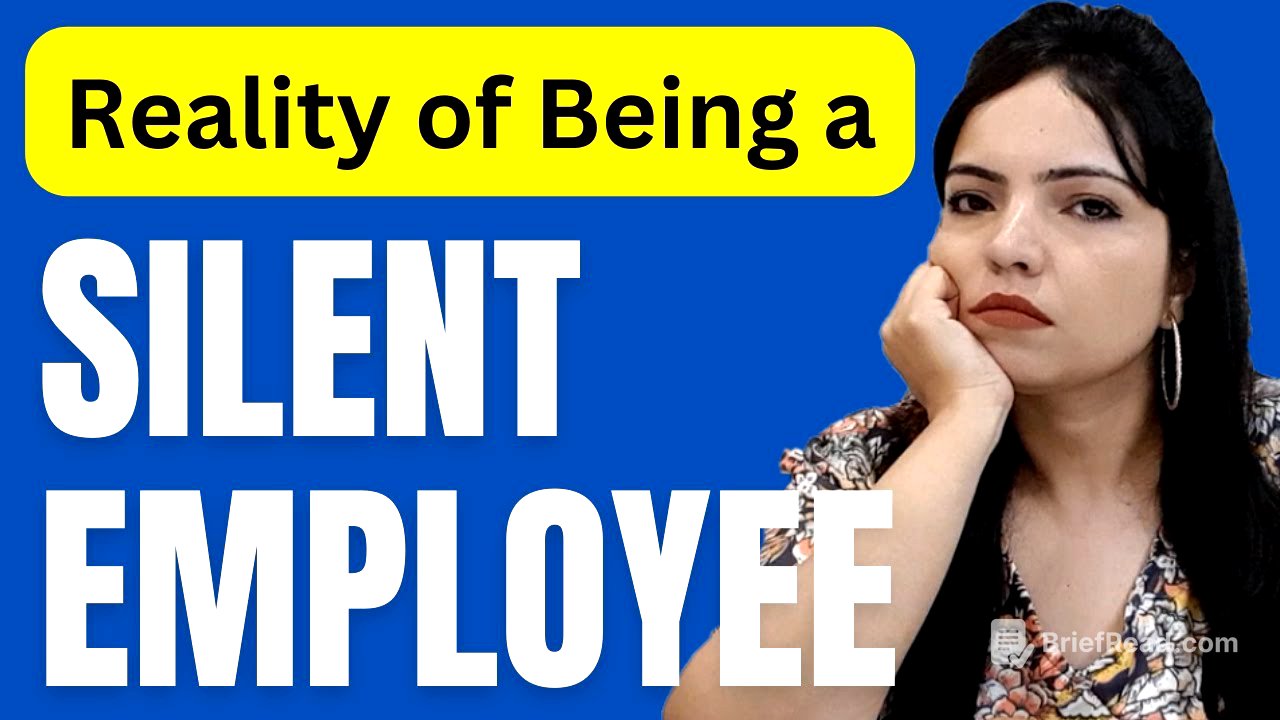TLDR;
This video discusses why silent employees often miss out on opportunities and recognition in the workplace. It highlights how being silent can lead to a lack of credit for your work, being blamed for mistakes, lower pay, missed growth opportunities, misjudgment of communication skills, and the assumption that you are always satisfied. The video encourages silent employees to speak up, communicate their needs and contributions, and actively participate in discussions to ensure they are recognized and valued.
- Silent employees often don't get credit for their work because their contributions are not visible.
- They are more likely to be blamed for mistakes due to their lack of communication.
- Silent employees often receive lower pay because they don't negotiate or voice their expectations.
- They miss out on growth opportunities because they are perceived as not interested in change or new challenges.
- Their communication skills are often misjudged, hindering their advancement to leadership roles.
- Managers may assume that silent employees are satisfied with their current situation, leading to stagnation.
Lack of Recognition for Work [0:00]
Silent employees often don't receive credit for their work because their contributions go unnoticed. While some believe that good work speaks for itself, managers may not always be aware of the effort and details involved. For example, a vocal employee might receive more recognition for a project, even if a silent employee did the majority of the work. This is because the vocal employee actively communicates about the project, giving the impression that they are the primary contributor.
Unfair Blame [2:16]
Silent employees are more likely to be blamed for mistakes, even if they are not at fault. This is because they are perceived as harmless and less likely to defend themselves. In situations where someone needs to deflect blame, a silent employee might be an easy target. Because they don't openly communicate or clarify issues, others may take advantage of their silence and attribute blame to them.
Lower Compensation [4:08]
Silent employees often receive less pay because they don't negotiate or voice their expectations. Managers may assume that they are content with their current salary and benefits. Without any objections or requests for raises, managers have no incentive to increase their compensation. To maximize their salary, silent employees need to negotiate and communicate their worth to their managers.
Missed Opportunities for Growth [5:32]
Silent employees frequently miss out on growth opportunities because decision-makers assume they are not interested in change or new challenges. They may be overlooked for projects or promotions that require strong communication skills. This unconscious bias leads to silent employees being sidelined in favor of those who are perceived as better communicators. To be considered for growth opportunities, silent employees need to demonstrate their capabilities and express their interest in new roles.
Misjudged Communication Skills [7:12]
Silent employees are often misjudged as having poor communication skills, which can hinder their career advancement. While they may simply prefer not to talk much, this can be misinterpreted as a lack of ability to communicate effectively. This misjudgment can prevent them from being considered for leadership roles that require strong communication and decision-making skills. To overcome this, silent employees need to actively display their communication skills and leadership potential.
Assumption of Satisfaction [9:22]
Managers may assume that silent employees are satisfied with their tasks, projects, compensation, and feedback. This assumption can lead to stagnation, as managers may not see the need to address any potential issues or concerns. If silent employees do not voice their opinions or concerns, managers will continue to believe that everything is going well. Therefore, it is crucial for silent employees to speak up and clarify their perspectives to ensure their needs are met.
Key Takeaways [10:31]
The key takeaways from the video are to stop treating yourself as a victim and to recognize the power you have to change your situation. It emphasizes the importance of speaking up and communicating your views, feedback, and needs. Being vocal is a skill that can be developed through practice, and it is essential for growth and success in the workplace. By actively participating and expressing yourself, you can ensure that your contributions are recognized and that you are not overlooked for opportunities.








![The Christian's Incompatibility with Sin, Part 2 (1 John 3:4–8) [Audio Only]](https://wm-img.halpindev.com/p-briefread_c-10_b-10/urlb/aHR0cDovL2ltZy55b3V0dWJlLmNvbS92aS94T2YzZEVEZkFNMC9ocWRlZmF1bHQuanBn.jpg)
